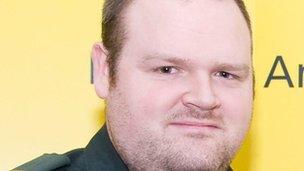London paramedics need police assistance 'at 200 homes'
- Published
More than 200 households are on a list of homes London Ambulance Service (LAS) staff will not visit without seeking police assistance.
A Freedom of Information request showed there were 390 households on LAS's Location Alert Register and 226 fell under its most serious classifications.
LAS said its paramedics were told to only delay treatment if they believed they were in danger.
It also said householders added to the list received a warning letter.
'Completely unprovoked'
LAS's alert register was divided into four categories.
It said 226 of those fell under categories one and two, which required a police call-out; where physical violence, threats with a weapon or "aggravated verbal abuse" had taken place.
But it also said paramedics were told they must not simply sit outside awaiting the arrival of police unless they believed they were at risk.
Its figures showed attacks on ambulance staff members took place more than once every day.
The largest number of households on the register were in the Whipps Cross catchment area in Leytonstone, which had 13 classified as Category 1, and 19 as Category 2.
Paramedic Leo Nakhimoff was hit in the head and arm with a fence panel, after he and two colleagues went to treat a drunk patient who had collapsed in a relative's garden, in January last year.
He said police officers who were called to help were attacked and injured, along with another paramedic.
Mr Nakhimoff said: "When you're going about your daily job treating patients you don't expect to get attacked with a fence post - it was completely unprovoked.
"It affected me quite badly at the time and I questioned whether I wanted to continue working as a paramedic. It's now at the back of my mind when I get called to similar incidents.
"At the end of the day, we're here to help people and we don't want to be in fear of being attacked."
Alerted to 'risk factors'

Paramedic Leo Nakhimoff was struck with a fence panel by a patient who was drunk
Former student paramedic Helen Parsons had the tendon in her finger bitten through when she was assaulted by a drunk patient in 2011.
Ms Parsons, who needed surgery, said: "He kept his teeth clamped on my finger while I tried to get him to let go and call for help from my crew-mate.
"I managed to get the side door of the ambulance open and jumped out, dragging him with me. When he fell out of the ambulance my crew-mate was able to prise his mouth open and free my finger."
Athar Khan, LAS operations manager, said the register was extremely important.
"It alerts the staff before they get to the address of the risk factors and actions they might need to take," he said.
"We take things into consideration. The address, the name of the individual and the physical location. The diagnosis given in terms of illness and the access to that property whether we can get in quickly and get out quickly."
- Published26 May 2013
- Published25 March 2011